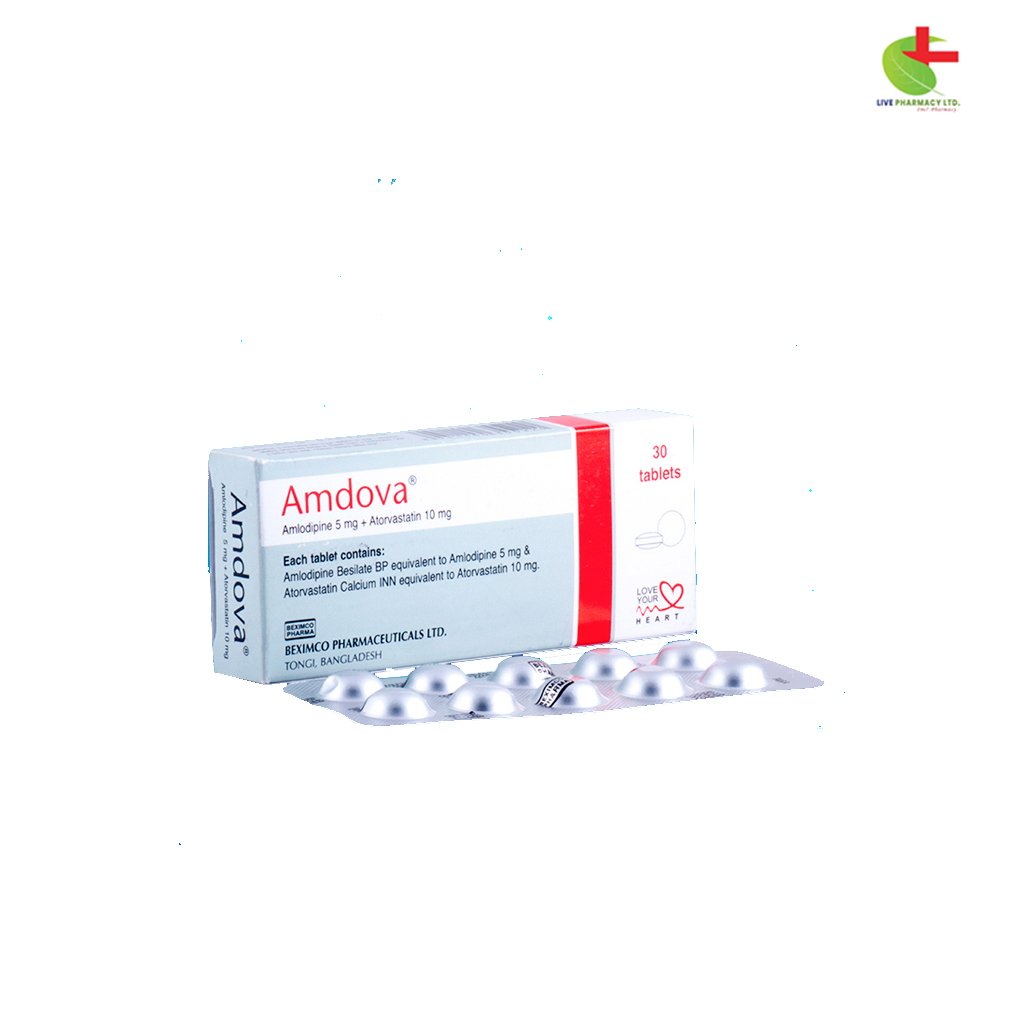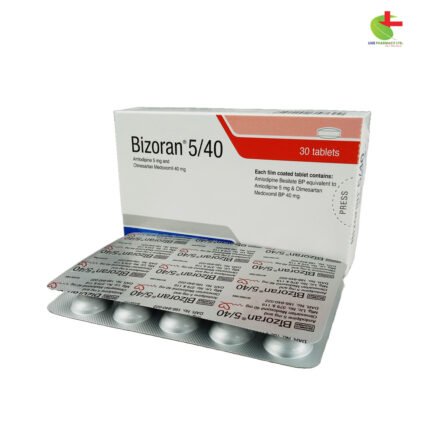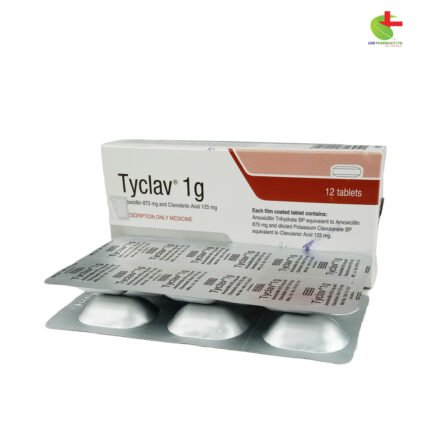Amdova
110.00৳ Strip
- Live Pharmacy offers a combination medication of Amlodipine and Atorvastatin, designed to treat hypertension, chronic stable angina, and high cholesterol.
- Amlodipine, a calcium channel blocker, helps reduce blood pressure by vasodilation.
- Atorvastatin, a statin, lowers cholesterol levels.
- This medication is effective in reducing the risk of nonfatal myocardial infarction and stroke in patients with multiple risk factors for coronary heart disease.
- Always follow your healthcare provider’s instructions for dosage and administration.
 Brand
Brand
|
Beximco Pharmaceuticals Ltd |
|---|---|
 Generics
Generics
|
Amlodipine Besilate + Atorvastatin |
 Type
Type
|
Tablet |
Indications
This combination of Amlodipine and Atorvastatin is indicated for patients needing treatment at the specified doses, including those with hypertension, chronic stable angina, and hypercholesterolemia. It is also suitable for hypertensive patients with multiple CHD risk factors to reduce the risk of nonfatal myocardial infarction (MI) and stroke.
Amlodipine: For hypertension, Amlodipine is effective in treating high blood pressure, either alone or with other antihypertensive medications. For coronary artery disease (CAD), it is suitable for managing chronic stable angina alone or with other antianginal or antihypertensive drugs. It can be used to treat confirmed or suspected vasospastic angina (Prinzmetal’s or Variant Angina) either alone or with other antianginal medications. In patients with recently documented CAD without heart failure or an ejection fraction below 40%, Amlodipine can reduce hospitalization risk due to angina and the need for coronary revascularization.
Atorvastatin: This medication is used alongside a diet to reduce elevated total cholesterol, LDL cholesterol, apolipoprotein B, and triglyceride levels in patients with primary hypercholesterolemia (both heterozygous familial and nonfamilial) and mixed dyslipidemia (Fredrickson Types IIa and IIb). It is also effective for patients with high serum triglyceride levels (Fredrickson Type IV), for primary dysbetalipoproteinemia (Fredrickson Type III) not responding adequately to diet, and to reduce total-C and LDL-C in patients with homozygous familial hypercholesterolemia when combined with other lipid-lowering treatments (e.g., LDL apheresis) or when such treatments are unavailable.
Pharmacology
This medication combines Amlodipine Besilate (5 mg) and Atorvastatin Calcium (10 mg). Amlodipine, a calcium channel blocker, is a peripheral arterial vasodilator that lowers blood pressure by reducing peripheral vascular resistance. Atorvastatin, a statin (HMG-CoA reductase inhibitor), is a synthetic lipid-lowering agent that inhibits the enzyme responsible for cholesterol synthesis.
Dosage & Administration
Amlodipine: For hypertension, start with 5 mg orally once daily, up to a maximum of 10 mg daily. Elderly patients or those with hepatic insufficiency may begin with 2.5 mg daily. Adjust dosage based on individual needs. For chronic stable or vasospastic angina, 5-10 mg daily is recommended, with the lower dose for elderly patients or those with hepatic insufficiency.
Atorvastatin: For general cholesterol reduction, initiate with 10 mg daily. The dosage range is 10-80 mg daily, with or without food. For homozygous familial hypercholesterolemia, the dosage ranges from 10 to 80 mg daily. For patients with renal insufficiency, no dosage adjustment is required. For moderate to severe hepatic dysfunction, although the therapeutic response is unaffected, exposure to the drug is increased.
Note: Always follow the doctor’s prescription for dosing.
Interaction
Atorvastatin: There is an increased risk of myopathy with concurrent use of cyclosporine, fibric acid derivatives, niacin, erythromycin, and azole antifungals. Plasma concentrations of atorvastatin decrease with antacid suspension (35%) and colestipol (25%), but LDL-C reduction remains effective. Co-administration with digoxin increases digoxin levels by 20%. Increases in norethindrone and ethinylestradiol levels by 30% and 20%, respectively, when used with oral contraceptives.
Amlodipine: May potentiate the effects of beta-blockers, ACE inhibitors, Alpha-1-blockers, and diuretics. No significant interaction with atorvastatin, digoxin, warfarin, or cyclosporine.
Contraindications
Amlodipine: Contraindicated in patients with known hypersensitivity to Amlodipine.
Atorvastatin: Contraindicated in patients with hypersensitivity to any component of the medication, active liver disease, or unexplained persistent elevations of serum transaminases exceeding three times the upper normal limit.
Side Effects
Amlodipine: Gradual vasodilation minimizes the risk of acute hypotension. Use cautiously in severe aortic stenosis. In heart failure patients, no clinical deterioration has been observed, but caution is advised for all calcium channel blockers.
Atorvastatin: May cause an elevation in serum creatine phosphokinase levels and uncomplicated myalgia. Therapy should be discontinued if markedly elevated CPK levels or myopathy occurs. Common side effects include constipation, flatulence, dyspepsia, abdominal pain, headache, nausea, myalgia, diarrhea, asthenia, and insomnia.
Pregnancy & Lactation
Pregnancy: Safety not established. Breastfeeding: Use of HMG-CoA reductase inhibitors during breastfeeding is not recommended.
Precautions & Warnings
Increased angina or myocardial infarction may occur upon starting or increasing the dosage of calcium channel blockers, particularly in patients with severe obstructive coronary artery disease. HMG-CoA reductase inhibitors may cause liver function abnormalities.
Use in Special Populations
Pediatrics: Safety and efficacy of Atorvastatin in children have not been established. Geriatrics: Similar efficacy and safety in older patients as in the general population.
Therapeutic Class
Anti-anginal & Lipid-Lowering Drugs
Storage Conditions
Store in a cool, dry place away from light and moisture. Keep out of reach of children.













Reviews
There are no reviews yet.